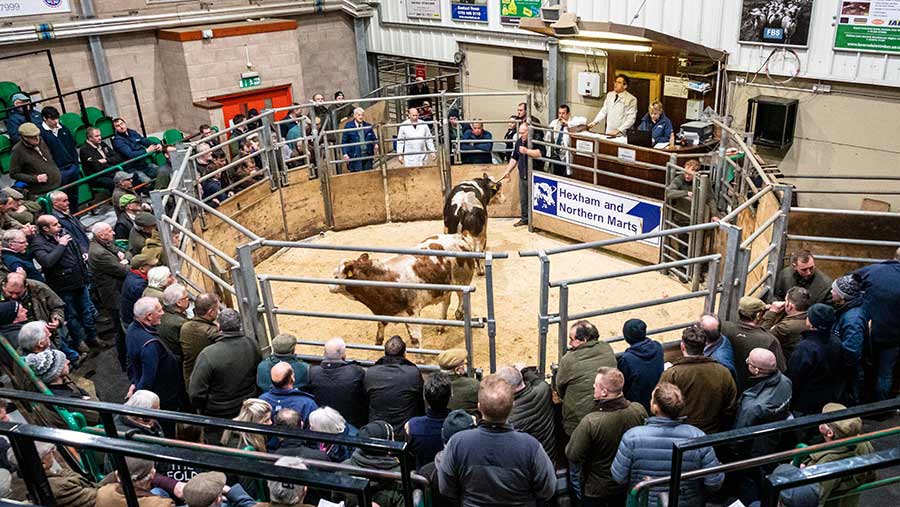Store cattle move to £3/kg and tipped to go dearer
 Store cattle in the ring at Hexham Auction Mart © Robert Smith
Store cattle in the ring at Hexham Auction Mart © Robert Smith Nervous cattle finishers paying £3/kg liveweight for short-term stores may have to dig deeper through the year to keep yards full.
Latest industry insight from both sides of the Irish Sea suggests a tight store cattle and beef picture for the next two years.
Ferocious European demand has seen Irish live exports increase 35% to 41,363 head. Dutch and Spanish buyers are particularly keen for Irish youngstock.
See also: Second choice rearing calves lift £60-£100 in buoyant trade
Iain MacDonald, market intelligence manager at Quality Meat Scotland, has suggested UK store cattle supplies will tighten this year and into spring 2024 following a reduced suckler cow herd.
Defra figures show cow slaughter was up 11% on the year in the UK last autumn.
Tight cattle supplies have driven deadweight base prices to 485-500p/kg, depending on the size of the load.
Hexham stores dearer
Decent forward store cattle are £150-£200 a head dearer on the year, said Drew Patrick, cattle auctioneer at Hexham and Northern Marts.
Mr Patrick said a shortage of cattle had pushed prices up to £1,500-£1,600 a head for a 500kg R-grade bullock ready for three months in a finishing pen.
He said 580kg prime heifers at £3/kg killing out at 62% were matching the deadweight base of 485p/kg.
However, the pick of the butchers’ heifers around the northern markets had come to 540p/kg deadweight in recent weeks.
“Deadweight buyers tried pulling prices back 5p/kg last week, but couldn’t,” said Mr Patrick.
Cows and bulls in demand
Beef’s success in recent months has been the affordability and flexibility of mince and cheaper cuts, say analysts.
David Bowman of Hope’s Auctions, Wigton, said pie beef and mince demand had lifted trade 40p/kg for the lean, out-of-parlour cows, with 85-90p/kg animals now above 130p/kg.
Mr Bowman said “half-fed” dairy cows had made 190p/kg easily. Some farmers were finding it cheaper to feed beef cows than store cattle, with some lifting cows a grade and 150kg to leave a margin, he added.
Selby
Finished bull trade had been at £3/kg for the past month at Selby, said auctioneer Richard Haigh, stressing that size and fat cover was paying.
Bulls at 730-800kg had grossed upwards of £2,400. “It’s unusual for bulls to top the price per kilo, but it’s not slowing the clean cattle trade.”
The ever-scarcer Friesian bulls had made 240-250p/kg liveweight, and good continental-crosses out of the dairy herd at 580-640kg had made 270-280p/kg.
“Some of the continental bulls are filling the hole left by having fewer black-and-white bulls,” said Mr Haigh.
